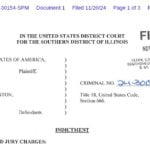Shelby Co. (ECWd) –
During a recent closed session of the Shelby County Board, numerous improper discussions took place that were not permitted under the Open Meetings Act. As it relates to this article, the OMA does not provide an exception for a closed session in order to raise questions as to the powers and duties of a County Treasurer, and considering the Treasurer does not answer to the County Board, going into closed session under the claim of personnel is improper.
One portion in particular is board member Bennett wanting to know how the Treasurer can say she can just not pay something when she is directed to pay something.
Bennett relies on her reading of information from the United Counties Council of Illinois rather than reading actual state law and applicable case law.
Of interest in this illegal closed session discussion is the State’s Attorney admitting in one breath there is no statute that allows the Treasurer to pay for the work in question, and then immediately follows with an assertion they are going to lose the Ed Flynn law suit. The State’s attorney also lied to the board about her communication with the Treasurer on the matter. She claimed it was over the phone and not by email, which is not true. The State’s Attorney emailed the treasurer, contrary to what she told the board, and provided this communication which will be a dedicated article in the future.
The audio of this brief discussion is below.
It would do Bennett well to actually read the information provided before discounting it based on the source, as she did in other portions of this closed session meeting (future article coming on those discussions).
The law is clear on what the Treasurer’s duties are, however, it appears Bennett and others are either not reading it or unable to comprehend basic law.
(55 ILCS 5/3-10005) (from Ch. 34, par. 3-10005)
Sec. 3-10005. Functions, powers and duties of treasurer. The treasurer has those functions, powers and duties as provided in the Sections following this Section and preceding Section 3-10006. He shall receive and safely keep the revenues and other public moneys of the county, and all money and funds authorized by law to be paid to him, and disburse the same pursuant to law.
The Treasurer has asked, what law permits her to pay a bill when there is no valid agreement or contract? The State’s Attorney confirms, there is no statute.
Further reading of the law answers Bennett’s question.
(55 ILCS 5/3-10013) (from Ch. 34, par. 3-10013)
Sec. 3-10013. Orders to be filled up and authorized. The county treasurer shall not countersign any county order before the same is filled up, nor until he shall have examined the records of the county board, and ascertained that the issuing of such order is warranted thereby.
(Source: P.A. 86-962.)
Board member Bennett and Chairman Cannon believe that just because the board voted to pay the bill, the Treasure has no option but to pay it. That is completely contrary to the law. The treasurer is the key “checks and balance” to a County Board’s actions. Using Bennett’s logic, anything they say pay must be paid, legal or not. Sadly, that has even been expressed by the current Chairman, Bruce Cannon, (article here). They are simply wrong.
Yes, the County Board voted to pay a bill. At that point, it is the Treasurer’s statutory duty to pay it but only once she has examined the records of the County Board and ascertained that the issuing of such order is warranted thereby. The Treasurer has clearly confirmed, issuing such an order is not warranted. Her own legal counsel has told her there is no statute.
We understand some board members are wanting to rely on the very next section of the law. What they don’t understand is you can’t just ignore the above section which must be read in conjunction with the entire statute.
(55 ILCS 5/3-10014) (from Ch. 34, par. 3-10014)
Sec. 3-10014. Payment of money. No money or funds shall be paid out of any county treasury, except in accordance with an order of the county board, or when payment is specially authorized by law to be made.
In counties which have delegated the authority to pay claims against the county, as provided by Section 1-6006, the County Treasurer may pay funds out of the County Treasury upon the order of the county officials designated to allow or disallow claims made against the county.
(Source: P.A. 86-962.
There are two exceptions for paying out funds in that section. One is based on an order from the board. The other is when payment is specially authorized by law to be made. It is well established and admitted in the audio and in an actual email, contrary to the State’s Attorney claim she did not put it in writing, there is no law authorizing the payment of county funds to a private attorney that has no agreement, contract, and that was hired illegally by the County Board.
We urged the entire board months ago to read through 69 pages (article here), of information provided by the Attorney General on this issue. It appears Bennett and others have ignored the established legal history on County Board’s hiring of private counsel.
Lastly, Bennett should read the case law on this point and pay particular attention to what the Illinois Supreme Court said.
“This court held that by law the State’s Attorney is “the attorney and legal adviser of the county officials in all matters pertaining to the official business of the county.” Ashton, 384 Ill. at 297. The Counties Code neither expressly nor implicitly authorized the county board to employ private attorneys. Ashton, 384 Ill. at 299. Therefore, the court held that private counsel could not enforce his contingent fee contract to perform legal services for the County, as the contract was wholly void. Ashton, 384 Ill. at 301.” That case has not been overruled or negatively treated on appeal either.
County law for dummies:
- Illinois Supreme Court said the County Code neither expressly nor implicitly authorized the county board to employ private attorneys. (They violated the law when hiring the attorney)
- The private counsel could not enforce his contingent fee contract, as the contract was wholly void. (The attorney can’t enforce his fee so you will not lose the lawsuit, provided you have competent legal counsel).
Since the Treasurer’s duty is to ensure payments are authorized by law to be made and the high court has said such payment, in this case, is not legal, it is clear the Treasurer has acted in good faith to protect the taxpayer’s funds from being disbursed.
The fact Bennett and others are continuing to push for this illegal payment should raise great concern to the taxpayers of Shelby County.
Bennett and any other board member who thinks this bill should be paid need to tender their resignation immediately.
The County is now facing two lawsuits on this matter. One from the Attorney seeking payment, and another from future county board member Mark Bennett. (Bennett lawsuit coverage in this article). We are confident the court will rule in line with what the Illinois Supreme Court has said on this very point and the county will not be required to pay the fees of the private attorney.
For the record, the closed session audio was released under our Freedom of Information Act request for those portions of the meeting that violated the Open Meetings Act. There is plenty more to expose from that closed session and we urge everyone to pay attention to what is being done behind closed doors in Shelby County.
We urge members of the public to attend the next County Board meeting on July 8th, 2020, and express their concerns over this matter.








1 Comment
PK
Posted at 10:42h, 29 JuneThe “About Us” menu at the United Counties Council of Illinois (UCCI) website has very limited information about the association. No officers, board members, nor membership are given. Members are required to pay annual dues, however.
With Ms. Bennett’s status quo opposition to the treasurer and her reference to the UCCI, I’ll suggest the budget committee realize a cost savings in annual UCCI dues.